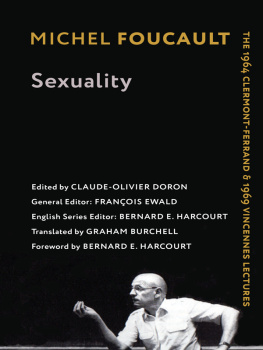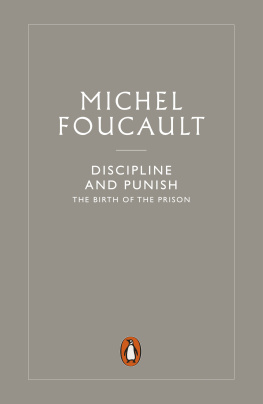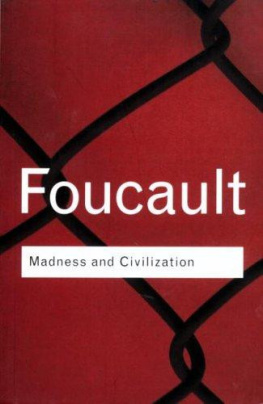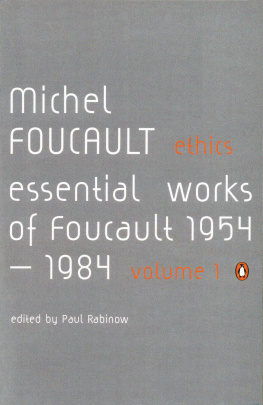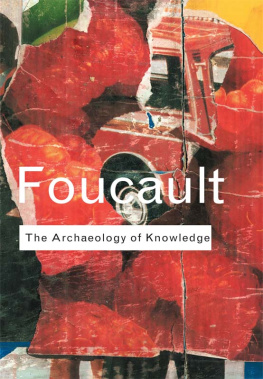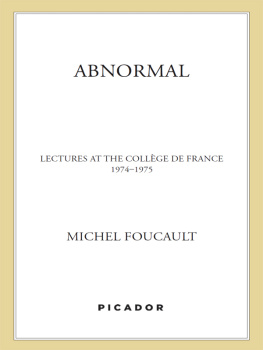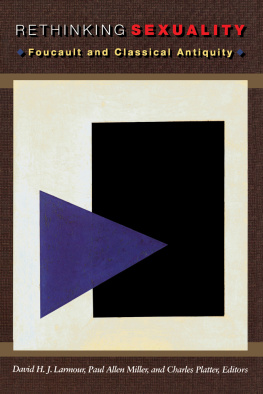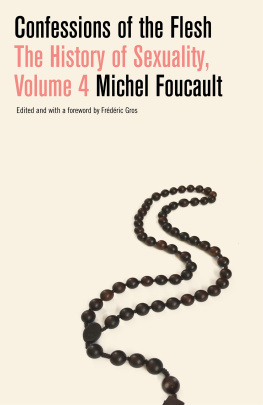Also by Michel Foucault
The Order of Things: An Archaeology of the Human Sciences
The Archaeology of Knowledge (and The Discourse on Language)
The Birth of the Clinic: An Archaeology of Medical Perception
I, Pierre Rivire, having slaughtered my mother, my sister, and my
brother. A Case of Parricide in the Nineteenth Century
Discipline and Punish: The Birth of the Prison
The History of Sexuality, Volumes 1, 2 and 3
Herculine Barbin, Being the Recently Discovered Memoirs of a
Nineteenth-Century French Hermaphrodite
Power/Knowledge: Selected Interviews and Other Writings,
1972-1977
The Foucault Reader (edited by Paul Rabinow)
FIRST VINTAGE BOOKS EDITION, NOVEMBER 1988
Translation copyright 1986 by Random House, Inc.
All rights reserved under International and Pan-American Copyright Conventions. Published in the United States by Random House, Inc., New York, and simultaneously in Canada by Random House of Canada Limited, Toronto. Originally published in France as Le Souci de soi by Editions Gallimard. Copyright 1984 by Editions Gallimard. This translation was originally published in hardcover by Pantheon Books, a division of Random House, Inc., in 1986.
Library of Congress Cataloging-in-Publication Data
(Revised for vol. 3)
Foucault, Michel.
The history of sexuality.
Translation of Histoire de la sexualit.
Contents: v. 1. An introduction v. 2. The use of
pleasure v. 3. The care of the self.
1. Sex customs History Collected works. I. Title.
HQ12.F6813 1980 306.7 79-7460
eISBN: 978-0-307-81926-0
v3.1

Contents
Translators Acknowledgments
My thanks go to Stephen William Foster and to Dennis Hollier for their help with this volume of The History of Sexuality.
R.H.
July 1986
PART ONE
 Dreaming of Ones Pleasures
Dreaming of Ones PleasuresI will begin by analyzing a rather singular text. It is a practical work dealing with everyday life, not a work of moral reflection or prescription. Of all the texts that have survived from this period, it is the only one that presents anything like a systematic exposition of the different forms of sexual acts. By and large it does not make direct and explicit moral judgments concerning those acts, but it does reveal schemas of valuation that were generally accepted. And one notes that the latter are quite close to the general principles that, already in the classical epoch, organized the ethical experience of the aphrodisia. The book by Artemidorus thus constitutes a point of reference. It testifies to a perenniality and exemplifies a common way of thinking. For this very reason, it will allow us to measure what may have been uncommon and in part new in the work of philosophical and medical reflection on pleasure and sexual conduct that was undertaken in the same period.
1

The Method of Artemidorus
The Interpretation of Dreams by Artemidorus is the only text that remains, in full, of a literature that was abundant in antiquity: the literature of oneirocriticism. Artemidorus, writing in the second century A.D ., himself cites several works that were in use in his day: those of Nicostratus of Ephesus, Panyasis of Halicarnassus, Apollodorus of Telmessus, Phoebus of Antioch, Dionysius of Heliopolis, and the naturalist Alexander of Myndus.
Addressing the man to whom his work is dedicated, a certain Cassius Maximus (possibly Maximus of Tyre, or his father, An emphatic statement of the sort that was rather customary in this kind of presentation? Perhaps. In any case Artemidorus did something quite different from compiling the most famous examples of prophetic dreams that were confirmed by reality. He undertook to write a work of method, and this in two senses: it was meant to be a manual for use in daily practice; it was also meant to be a theoretical treatise on the validity of interpretive procedures.
It was in this spirit that Artemidorus wrote The Interpretation of Dreams.
Artemidorus is mainly concerned to show the reader precisely how to go about it: How does one contrive to break down a dream into constituent parts and establish its diagnostic meaning? How does one manage also to take this whole into account in the decipherment of each of its parts? The comparison that Artemidorus makes with the divinatory techniques of sacrificers is significant: they, too, know how each individual sign fits into the whole, and yet they base their judgments as much on the total sum of the signs as on each individual sign. In any case, he offers the book as a manual for living, a tool that can be used over the course of ones existence and adapted to lifes changing circumstances: just as there is an order and sequence in actual events so he has made an effort to set down everything in an orderly fashion.
This handbook-for-daily-living aspect is quite noticeable The typical dreamer whom Artemidorus addresses is not a worried devotee who attends to injunctions given from above. He is an ordinary individual: generally a man (the dreams of women are noted as an aside, as possible variants in cases where the sex of the subject happens to change the meaning of the dream); a man who has a family, possessions, quite often a trade (he runs a business; he has a shop). He is apt to have servants and slaves (but the case is considered in which he has none). And, besides his health, his chief anxieties concern the life and death of his entourage, his enrichment, his impoverishment, the marriage of his children, the functions he may be called upon to exercise in the city. In short, an average clientele. Artemidorus text is revelatory of a type of preoccupations characteristic of ordinary people.
But the work also has a theoretical interest at stake, which Artemidorus speaks of in the dedication to Cassius: he aims to refute the adversaries of oneiromancy. He wishes to convince the skeptics who do not believe in all those forms of divination by which one attempts to decipher the signs that foretell the future. Artemidorus will seek to establish these certitudes not so much by a plain exposition of his findings as by a carefully considered procedure of inquiry and a discussion of method.
He does not mean to dispense with earlier texts; he has taken pains to read them, but not in order to recopy them, as many writers do; what interests him in the already said is not established authority but rather the breadth and variety of experience to be found there. And he has not searched for this experience in a few great authors, but has insisted on going to those places where it is formed. As he says in the dedication to Cassius Maximus, and later repeats, Artemidorus takes pride in the breadth of his inquiry. Not only has he compared innumerable works, he has patiently frequented the market stalls kept by dream readers and soothsayers at the crossroads of the Mediterranean world. I, on the other hand, have not only taken special pains to procure every book on the interpretation of dreams, but have consorted for many years with the much-despised diviners of the marketplace. People who assume a holier-than-thou countenance and who arch their eyebrows in a superior way dismiss them as beggars, charlatans, and buffoons, but I have ignored their disparagement. Rather, in the different cities of Greece and at the great religious gatherings in that country, in Asia, in Italy and in the largest and most populous of the islands, I have patiently listened to old dreams and their consequences. For there was no other possible way in which to get practice in these matters. Artemidorus text offers the considerable advantage of presenting a careful reflection on a vast body of traditional material.
Next page

